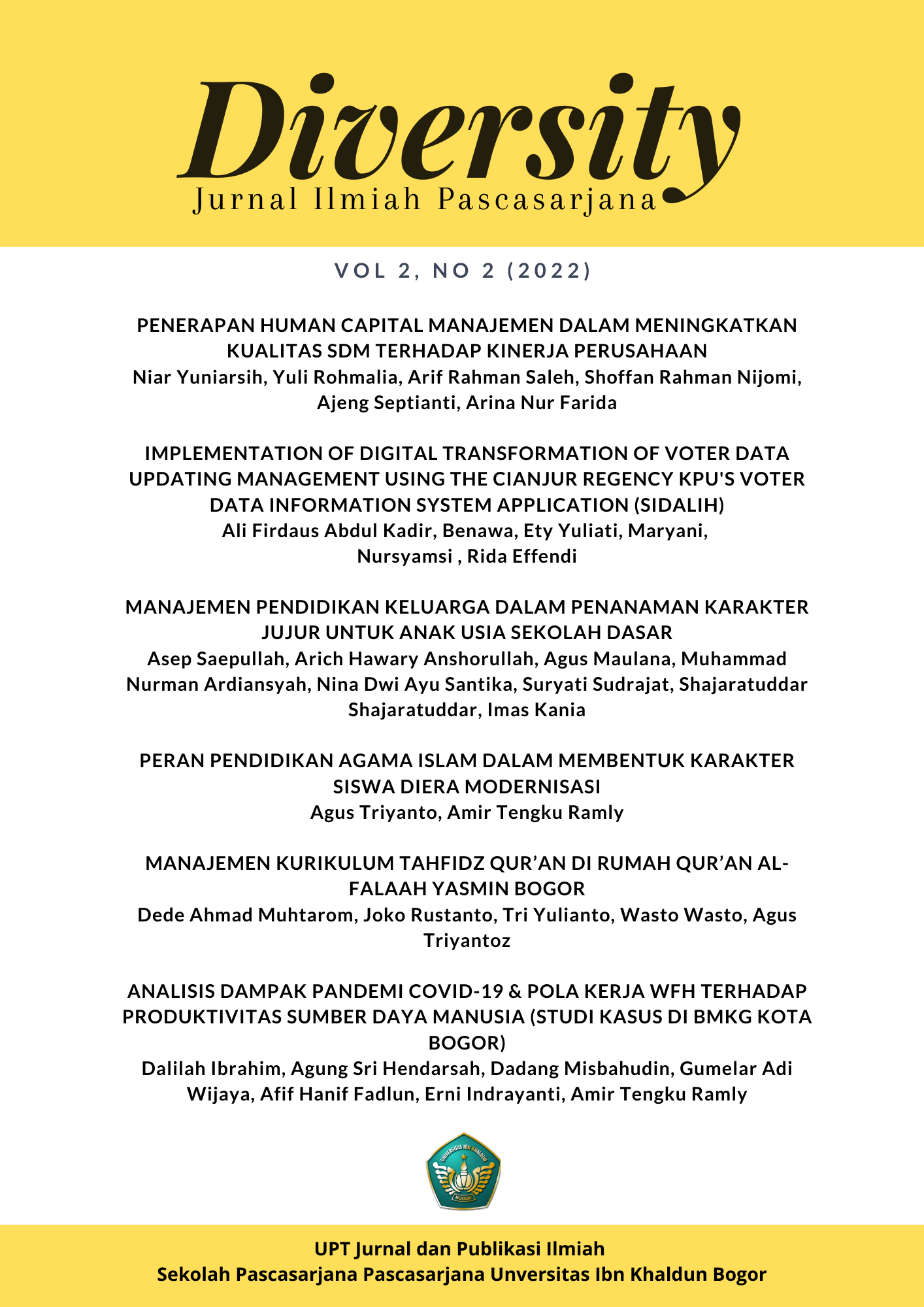Analisis Dampak Pandemi Covid-19 & Pola Kerja WFH Terhadap Produktivitas Sumber Daya Manusia (Studi Kasus di BMKG Kota Bogor)
DOI:
https://doi.org/10.32832/djip-uika.v2i2.7600Abstract
The Covid-19 Virus pandemic has made changes to all work activities in the world including Indonesia. The implementation of WFH (Work From Home) work patterns certainly has an influence on work productivity. This research was conducted at the Bogor City BMKG Office office, with the aim of knowing the influence of the Covid-19 Virus and WFH (Work From Home) work patterns on human resource productivity. The quality of work, and the timeliness while working becomes difficult to measure, so it is necessary to conduct research in order to understand how the Covid-19 Virus pandemic and WFH work patterns affect HUMAN PRODUCTIVITY This study has implications for the world of work that wants to measure productivity to determine the direction of the Company's policies in the future, including in government agencies. This research is quantitative research, using questionnaires distributed to 30 civil servant respondents of the Operational engineering and management work unit at the BMKG Office and also through the study of journal article literature. The method used is multiple Linear regression using SPSS 25 application with Descriptive Statistical Test, Classical Assumption Test, Normality Test, Multicoliniarity Test, Heteroskedasticity Test, Atocorrelation Test. The results showed that the variable impact of Covid-19 (X1) significant value is 0.127 > 0.05, so it can be concluded that H0 is accepted and H1 is rejected. This means that there is no effect of the impact of covid (X1) on human resources productivity (Y). Variable Working pattern WFH (X2) significant value is 0.710 > 0.05, then it can be concluded that H0 is accepted and H1 rejected. This means that there is no effect of the impact of covid (X1) on human resources productivity (Y). Variable Working pattern WFH (X2) significant value is 0.710 > 0.05, then it can be concluded that H0 is accepted and H1 rejected. This means that there is no influence of WFH (X1) work patterns on HR productivity (Y). In this study, it can be concluded at the BMKG Office of Bogor City Covid-19 Pandemic and WFH work patterns have no effect on human resources productivityReferences
Adnan, A., Saragih, R., Bisnis, F. K., Telkom, U., Kerja, P., & Karyawan, K. (2019). Pengaruh Disiplin Kerja Dan Produktivitas Kerja Terhadap Kinerja Karyawan Badan Meteorologi Klimatologi Dan Geofisika ( Bmkg ) Jakarta the Effect of Work Discipline and Work Productivity on Employee Perfomance At Employee Performace Meteorologi Climatolog. 6(2), 4191– 4197.
Arikunto, S. 2010. Prosedur Penelitian Suatu Pendekatan Praktik. Jakarta: Rineka Cipta.
Arikunto, Suharsimi, 1995, Manajemen Penelitian, Rineka Cipta, Jakarta.
Anggraini, D. & Mukminin, A. (2021). Pengaruh Lingkungan Masa Pandemik Covid 19 Terhadap Produktivitas Kerja Pegawai Pada Dinas Kependudukan dan Pencatatan Sipil (Disdukcapil) Kota Bima, Jurnal Disrupsi Bisnis, Vol.4 No.4, Juli 2021 (314 – 326) http://dx.doi.org/10.32493/drb.v4i4.10906
Djuwita, T. M. (2011). Pengembangan Sumber Daya Manusia Dan Produktivitas
Kerja Pegawai. Manajerial : Jurnal Manajemen Dan Sistem Informasi, 10(2), 15–21.
Likert, Rensis (1932) , "A Technique for the Measurement of Attitudes”, Archives of pshycholog
Nurrahmawati, L., Ismail, I., & Kuswinarno, M. (2014). Pengaruh Pengembangan Sumber Daya Manusia Dalam Meningkatkan Produktivitas Karyawan PT . BRI ( PERSERO ), TBK Cab . Jurnal Studi Manajemen Dan Bisnis, 1(1), 43–52.
Prastyani, D., & Muslimah, I.S. (2021) Analisis Produktivitas Karyawan Saat Pandemi COVID-19 melalui Kesehatan dan Keselamatan Kerja, Lingkungan Kerja dan faktor psikologis kaeyawan, Forum Ilmiah Vol. 18 No.3, September 2021 (306 – 319)
Pramanik, N. D. (2020). Pengaruh Pandemi COVID-19 Terhadap Produktivitas, Etos Kerja dan Motivasi Karyawan Selama Bekerja di Rumah (WFH). Jurnal EKBIS, 8(1), 1–11.
Putra, Y. D., & Sobandi, A. (2019). Pengembangan sumber daya manusia sebagai faktor yang mempengaruhi produktivitas kerja. Jurnal Pendidikan Manajemen Perkantoran, 4(1), 127. https://doi.org/10.17509/jpm.v4i1.14963
Rahmawati, D. (2013). Pengaruh Motivasi Terhadap Produktivitas Kerja Karyawan Pr Fajar Berlian Tulungagung. Jurnal Universitas Tulungagung Bonorowo, 1(1), 1–16. http://www.jurnal-unita.org/index.php/bonorowo/article/view/6/6%0Ahttp://www.jurnal-unita.org/index.php/bonorowo/article/view/6
Susanti, R., dkk. (2021). Produktivitas Kerja Saat Work From Home (WFH) dan Work From Office (WFO) pada Dosen FKM Universitas Mulawarman di Masa Pandemi Covid-19, Jurnal Ilmiah Kesehatan Masyarakat, Vol.13, Ed.1, 2021
Widjaja, W., Ashadi, M., & Cornellia, V. (2021), Budaya Kerja WFH di Masa Pandemi COVID-19 : Dampaknya terhadap Produktivitas Karyawan di Industri Ritel, Jurnal Edodemica: Jurnal Ekonomi, Manajemen dan Bisnis, Vol.5 No.2, Sept 2021 (103 – 112) http://ejournal.bsi.ac.id/ejurnal/index.php/ecodemica







